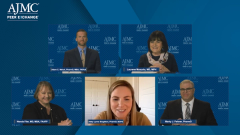
Increasing Awareness of RSV Vaccines
Dr Welch leads a conversation regarding strategies to increase awareness of respiratory syncytial virus.
Episodes in this series

Adam C. Welch, PharmD, MBA, FAPhA: We’ve talked a lot about what RSV [respiratory syncytial virus] is. Let’s talk about managing RSV infections. Mr Feltner, what can health care providers do to increase awareness in our patients about RSV?
Marty J. Feltner, PharmD: First, we need to identify at-risk patients in clinical settings who are eligible: with heart disease and lung disease, candidates and older adults in long-term-care facilities. We need awareness in our community, within our practice settings, so we’re ready to go once the RSV vaccine is approved.
Adam C. Welch, PharmD, MBA, FAPhA: Do you think the lack of public awareness of RSV, particularly in older adults, has impacted clinical practice?
Marty J. Feltner, PharmD: Absolutely. The community feels RSV is a pediatric virus, but it’s an adult virus as well; we’ve seen that. We don’t know the prevalence of transmission in our community. There’s an uphill battle that we’re going to face in the health care community to educate. We need to come together as a team so we can educate the public and our health care community of the benefits and RSV vaccine, which will be coming out this year.
Adam C. Welch, PharmD, MBA, FAPhA: Dr Filer, how does a physician who has a limited amount of time with their patient get all this done?
Wanda Filer, MD, MBA, FAAFP: I ask myself that every day. It’s a matter of prioritization. You have the patient’s needs and what they would like to get done in a visit. I have things I need to get done in a visit, and we mesh those on a regular basis. I’m a past president of the American Academy of Family Physicians, so I’ve talked to thousands of colleagues around the country. One good thing is that if you have a relationship with a medical home, it doesn’t all have to be done at 1 visit. But prevention has to be in the recipe. You have to be able to talk about when your mammogram was, when your colon cancer screening was, and getting caught up on those.
Coming out of the pandemic, a lot of prevention has gone by the wayside. We need to redouble our efforts. We’ve got a lot of ground to make up on vaccines, both pediatric and adult. There’s an lot of need to work as a community in health care to strengthen our language around prevention. We’re working on a campaign in which we send text messages to patients. If we know someone has a visit, we’ll send a text message 72 hours and 24 hours before saying a vaccine will be waiting for you. The goal is to have them think about it, to have them realize that they want to open that conversation. If their medical home doesn’t have a particular vaccine, they’ve got a pharmacy colleague they can go to. Wherever a patient can get that vaccine that’s convenient and comfortable and where they have a trusting relationship makes a difference.
We also make sure that we teach providers how to give a strong personal recommendation: this vaccine is meant for you. I’ve had this vaccine myself. I want you to get it. I know what’s wrong with you. I’ve treated COPD [chronic obstructive pulmonary disease]. I don’t want you to fall prey to this virus.
Marty J. Feltner, PharmD: Amen.
Laurene Mascola, MD, MPH: It takes a team to vaccinate a patient. From the minute that patient walks into your office, the individual who’s checking in the patient says: “You’re here today. You’re this age. These are the vaccines you need.” There’s information in the office for them to look at. Maybe there’s a text ahead of time when they go back and get their blood pressure and height and weight: “You’re going to get vaccines today.” The data show that if health care providers recommend a vaccine, patients are more likely to get it. We know how busy physicians are in treating adults, especially with their many underlying diseases. But if everyone is part of that team, then you can get the patient vaccinated. It’s the whole team in that office, not just the physician who needs to be educated and on board.
Marty J. Feltner, PharmD: That’s100% right. Pharmacists are uniquely positioned to step in and help the medical community, especially physicians, by identifying patients. Pharmacists are short on time, but technicians can help out. Technicians helping immunize against COVID-19 was a game changer in retail pharmacy. Get your technicians involved, make sure they’re educated, and they can help identify patients picking up their prescription. Get your cashiers and your supportive personnel educated so that as a team, we’ll be successful at identifying patients and immunizing them against RSV.
Wanda Filer, MD, MBA, FAAFP: For all of us, our goal is to keep patients healthy. Our goal is to keep them out of the hospital and emergency department, without complications and vaccine-preventable illness. I have memories of the nurse saying to me, “She doesn’t want a flu vaccine.” They’ll say, “Dr Filer is going to tell you about it,” and you walk in and say, “Which arm do you want it in?” Then they say, “OK,” because we trust one another. The patients trust me. I trust them. I’m here to do what’s best for them. I feel the same way about my pharmacy colleagues.
It’s important that patients can get that vaccine wherever they’re most comfortable. We all have to give a consistent message and make sure their out-of-pocket costs are slim or none in case they can’t afford it. We need early protection, early coverage, and payment for that vaccine at the same time because these vaccines save lives, and they save a lot of human suffering and downstream costs.
Laurene Mascola, MD, MPH: As we get older, it’s not the quantity of life that we have left but the quality of life. By providing these vaccines to our patients, we’re increasing their quality of life. For older adults, that’s very important.
Adam C. Welch, PharmD, MBA, FAPhA: During the COVID-19 pandemic, patients were less likely to get their routine vaccinations. Providing a strong provider recommendation for the importance of vaccines is essential with this vaccine.
Laurene Mascola, MD, MPH: Yes.
Wanda Filer, MD, MBA, FAAFP: It’s the only thing that’s consistently been shown to help patients make that decision. A strong personal recommendation from a health care professional you trust is what moves the needle, no pun intended. It encourages that patient because they know you’re invested in them, and they trust you.
Adam C. Welch, PharmD, MBA, FAPhA: Repetition of that strong recommendation is also important. We need to have multiple individuals along their health care journey tell them that it’s essential for them to receive that vaccine.
Transcript edited for clarity.
Newsletter
Stay ahead of policy, cost, and value—subscribe to AJMC for expert insights at the intersection of clinical care and health economics.










